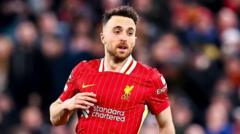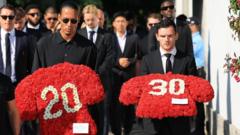With the death of Pope Francis, the Vatican and the global Catholic community mourn the loss of a transformative figure who championed inclusivity. Cardinals now face pivotal decisions about the church’s direction as tributes pour in.
A New Era Begins as Pope Francis Passes Away at 88

A New Era Begins as Pope Francis Passes Away at 88
The Vatican announces the passing of Pope Francis, a beloved leader whose inclusive teachings transformed the Catholic Church.
April 21, 2025, at 12:02 p.m. in Vatican City marks a somber moment for the Catholic Church as Pope Francis, the pontiff renowned for his inclusive approach, has passed away at the age of 88. Cardinal Kevin Farrell, standing at the Vatican, confirmed the news with deep sorrow, stating, “At 7:35 this morning, the Bishop of Rome, Francis, returned to the house of the Father.” His passing has triggered an immediate wave of grief, as thousands gather in St. Peter’s Square to honor the pope who blessed the faithful just the day before during Easter celebrations.
As tributes overflow from global leaders, praising Francis for his dedication to the underprivileged and marginalized, the Church's cardinals find themselves at a crucial crossroads: will they pursue his vision of an inclusive church, or revert to the doctrinal rigidity of past leadership? Francis, who faced significant health challenges leading up to his death, had recently emphasized the church’s need to advocate for social justice and welcome those often overlooked by society.
Despite facing hurdles regarding clerical sexual abuse and financial controversies within the church, Francis had forged an unprecedented global platform for Catholicism. The implications of his absence are profound, as the cardinals must now deliberate who will succeed him and uphold—or diverge from—his progressive legacy. His funeral will follow long-standing traditions, providing world leaders and the faithful an opportunity to pay their respects. In death, as in life, the complexity of Francis’s impact will certainly influence the future course of the Catholic Church as it navigates this pivotal moment in history.
As tributes overflow from global leaders, praising Francis for his dedication to the underprivileged and marginalized, the Church's cardinals find themselves at a crucial crossroads: will they pursue his vision of an inclusive church, or revert to the doctrinal rigidity of past leadership? Francis, who faced significant health challenges leading up to his death, had recently emphasized the church’s need to advocate for social justice and welcome those often overlooked by society.
Despite facing hurdles regarding clerical sexual abuse and financial controversies within the church, Francis had forged an unprecedented global platform for Catholicism. The implications of his absence are profound, as the cardinals must now deliberate who will succeed him and uphold—or diverge from—his progressive legacy. His funeral will follow long-standing traditions, providing world leaders and the faithful an opportunity to pay their respects. In death, as in life, the complexity of Francis’s impact will certainly influence the future course of the Catholic Church as it navigates this pivotal moment in history.






















